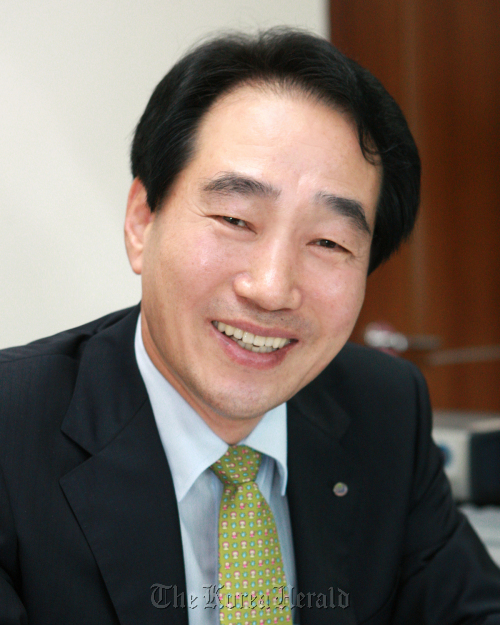Korea’s sole casino for locals adds hotel, condo, ski slopes, convention center and water park
Spurred by its robust casino business, Kangwon Land has been striving to transform into a multiplex resort and one of Asia’s leading tourist destinations.
Its decade-long efforts are now coming to fruition. In addition to bustling gambling floors, it now features two hotels, condominiums, an 18-slope ski resort, a golf course and a convention venue with a water park slated for 2015.
Also known as High1 Resort, the sole domestic casino complex accessible to Koreans was launched in 2000 in a government plan to revitalize waning coal mining towns in the country’s eastern province of Gangwon.
Despite public concerns over addiction and corruption, the Jeongseon-based company is committed to establishing gambling as a lucrative industry and drawing tourism cash to the provincial economy, said Choi Hung-jip, its chief executive.
“From outside, Kangwon Land may well be seen as a casino. But if you come here and see for yourself, you’ll instantly realize it’s simply one component of a booming resort complex,” Choi told The Korea Herald in February.
 |
Choi Hung-jip |
Majority-owned by local governments, Kangwon Land will maintain a monopoly for local visitors until 2025 under a special law. It transfers more than 10 percent of its revenue to the public coffers each year through taxes and a tourism fund.
In September, the listed firm unveiled a long-term growth roadmap to diversify income sources and rein in its heavy reliance on the casino operations, which produce about 95 percent of the total revenue.
Under the 2020 vision, Kangwon Land aims to boost the number of annual guests to 10 million, foster new business areas such as a theme park, shopping and exhibitions and enhance living conditions and infrastructure for residents.
It set aside nearly 550 billion won ($483.5 million) to bolster tourism and industrial development by creating entertainment, leisure and cultural facilities in the four locales ― also including Taebaek, Donghae and Samcheok.
“By 2025, we’ll make Korea’s best vacation spot at an altitude of some 1,000 meters that can prop up the local economy, resolve the regional strife and create jobs,” Choi said.
About 64 percent of its 4,600 employees grew up in the region, he noted. That includes 1,200 workers who manufacture goods or provide services for the company.
Sales shot up almost 14-fold in 10 years to about 1.27 trillion won last year, according to a filing with the Korea Exchange. The number of guests spiked to 4.5 million from less than 210,000 during that period.
Still, the mega project remains controversial. While the casino is flooded with visitors, its economic impact appears to have barely spilled over into the surrounding area. On a typical weekday, a handful of stores and restaurants remained open even just outside the resort complex other than motels and pawnshops.
With its business thriving, the firm’s exclusive casino operation rights were at the center of a debate last year over whether to allow locals onto the 17 other gambling floors across the country. Renowned casino heavyweights like Sheldon Adelson of the Las Vegas Sands and some senior government and industry officials called for deregulation to court more foreign investors.
Choi rebuffed the calls, saying that such a policy shift would wreak havoc on Kangwon Land and ultimately the region’s economy.
“Before putting priority on commercial interests, we all have to keep in mind why the casino was built here. Reviving the local economy is its sole raison d’etre. It never existed for the sake of the casino business,” he said.
The company claims to have generated nearly 1 trillion won in economic impact so far, on top of 3.41 trillion won of taxes it has paid since the 2000 opening of its casino.
To alleviate addiction concerns, it caps the number of visitors to the casino to one day per month for villagers and 20 days for other guests. It also runs addiction care facilities to provide consultation and therapy for frequent gamblers. The firm injects about 20 billion won a year into social responsibility activities.
With the province hosting the 2018 Winter Olympics, Kangwon Land is hoping to open up a fresh business opportunity through its brand new convention center.
Its 5,700-square-meter banquet hall, the country’s largest and the region’s only, can accommodate 1,700 guests and has top-notch event equipment including a five-language simultaneous interpretation system, company officials said.
The International Ski Federation, a leading organization for ski sports based in Switzerland, is slated to hold an annual meeting at the resort complex in May. Pyongchang is about two hours away from Jeongsun.
“The FSI event is going to be the first ever in Asia and the chance for Kangwon Land to be introduced to the world,” Choi said.
By Shin Hyon-hee (
heeshin@heraldcorp.com)








![[Today’s K-pop] Blackpink’s Jennie, Lisa invited to Coachella as solo acts](http://res.heraldm.com/phpwas/restmb_idxmake.php?idx=644&simg=/content/image/2024/11/21/20241121050099_0.jpg)